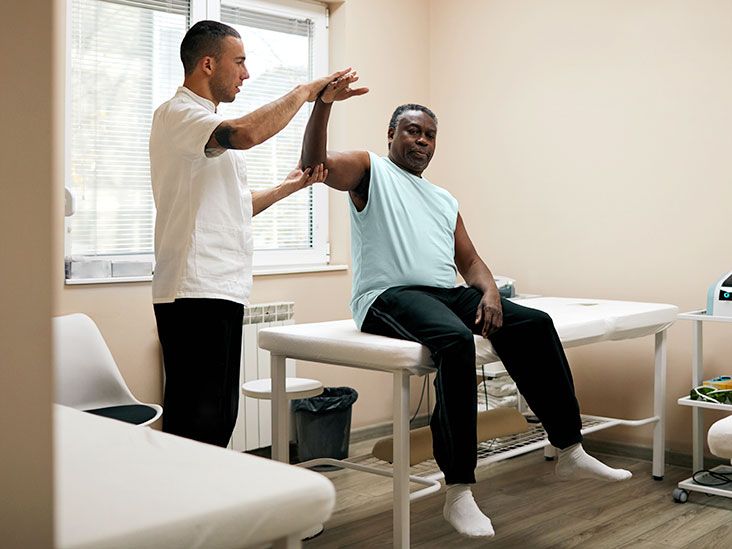Alternative Healing: Professional Physical Therapists Roanoke Tailoring Solutions
Wiki Article
Exactly How Physical Therapists Help in Injury Rehab
Physiotherapists play a critical role in injury recovery, using their expertise to help patients in their healing journey. With a mix of evaluation, treatment preparation, and continuous monitoring, these specialists assist individuals reclaim their physical capability and enhance their top quality of life. The first step involves analyzing the nature and degree of the injury, which permits the physiotherapist to create a customized therapy strategy tailored to the patient's details needs. This strategy may include handbook treatment strategies to deal with discomfort and enhance mobility, along with personalized exercise programs to enhance muscular tissues and advertise general healing. In addition, physiotherapists offer education and learning on injury avoidance and self-management, empowering individuals to take an active function in their rehab process. With their understanding and advice, physiotherapists guide people towards an effective recovery, changing therapy as necessary to make sure progression is made.Assessing the Injury and Establishing a Therapy Plan
To accurately examine an injury and create a reliable treatment strategy, physical therapists systematically examine the level of the injury and its effect on the individual's practical capacities. This analysis process is vital as it permits the physical specialist to collect unbiased information and info regarding the injury, allowing them to make educated decisions regarding the appropriate therapy interventions.Throughout the evaluation, physical specialists utilize a selection of strategies and tools to gather details concerning the injury. In addition, physical specialists may assess clinical documents, analysis imaging reports, and other appropriate papers to acquire a comprehensive understanding of the injury.
As soon as the evaluation is full, physiotherapists make use of the collected information to establish a customized therapy strategy for the client. This strategy might include restorative workouts, hands-on therapy methods, techniques such as warm or chilly treatment, and education on injury prevention and self-management approaches. The treatment plan is tailored to attend to the certain requirements and goals of the patient, intending to recover their functional abilities and enhance their overall lifestyle.
Utilizing Hands-on Therapy Methods
Physical therapists use manual treatment techniques to resolve the certain demands and objectives of injured individuals, boosting the effectiveness of their treatment strategies. Hands-on therapy entails hands-on methods that aim to boost flexibility, reduce pain, and advertise recovery. These strategies are based on an extensive understanding of composition, physiology, and biomechanics, enabling therapists to target specific areas of the body with accuracy.One frequently used hands-on therapy method is joint mobilization. This technique includes the skilled application of force to a joint, intending to recover its regular range of movement. By carefully mobilizing the joint, physiotherapists can minimize rigidity, improve adaptability, and decrease pain.
Soft tissue mobilization is another hands-on treatment strategy frequently utilized by physical therapists. This technique entails using pressure and activity to muscular tissues, tendons, tendons, and other soft cells to enhance circulation, reduce muscle tension, and promote recovery.
Furthermore, manual treatment methods such as massage therapy and extending can assist unwind muscle mass, enhance versatility, and boost general function (Roanoke physical therapy). These strategies are frequently combined with restorative exercises and various other therapy modalities to attain ideal results
Designing and Supervising Custom-made Exercise Programs
Building upon the manual treatment strategies gone over previously, physiotherapists utilize their knowledge to style and oversee customized exercise programs for hurt people. These exercise programs are tailored to the details requirements and capacities of each individual, thinking about their injury, case history, and overall goals for rehabilitation.The very first step in designing a personalized workout program is to perform a complete assessment of the patient's condition. Physical specialists will review the individual's stamina, flexibility, series of motion, and functional capabilities. This analysis aids them recognize any kind of areas of weakness or imbalance that need to be addressed via targeted workouts.
Once the assessment is complete, the physical specialist will develop a workout program that consists of a range of exercises targeting various muscle mass teams and movement patterns. These exercises may include extending, reinforcing, balance training, and cardiovascular tasks. The specialist will also think about the person's choices, way of living, and readily available sources when designing the program.
When the exercise program is designed, the physiotherapist will guide the individual through each exercise, guaranteeing appropriate kind and method. They will give support and support, making adjustments as required to guarantee the workouts are testing however not also exhausting. The specialist will likewise track the individual's development and make adjustments to the program as the individual's capacities enhance.
Giving Education And Learning on Injury Avoidance and Self-management
Furthermore, physical therapists educate damaged individuals on injury avoidance and self-management techniques. By offering education on injury avoidance, physical therapists empower people with the expertise and devices essential to minimize the danger of re-injury.
Additionally, physical therapists enlighten patients on the significance of adherence to their treatment strategy. They discuss the factors behind each intervention and the expected outcomes, making certain that clients comprehend the function and benefits of their treatment. By equipping individuals with this knowledge, physical therapists encourage active involvement in their very own recuperation process, promoting a sense of possession and duty for their wellness.
Tracking Development and Adjusting Therapy as Required

Physical therapists use various approaches to monitor development. They evaluate the client's variety of activity, strength, adaptability, and total useful capacities. They might also utilize specialized tests and measurements to track improvements and determine areas that need further focus.
By very closely checking the progress, physical therapists can recognize any kind of potential barricades or challenges that may develop during the rehabilitation procedure. This allows them to make prompt adjustments to the treatment strategy, ensuring that the treatment continues to be effective and relevant to the individual's requirements.
Adjustments to the treatment plan may include modifying exercises, enhancing or reducing the strength of therapy, or introducing new strategies or modalities to deal with certain areas of problem. The goal is to optimize the rehab process and help with a quicker and more total recuperation for the patient.
In addition to keeping an eye on progression and adjusting treatment, physical therapists likewise give recurring education and learning and assistance to their people. This aids them understand their condition better, promotes self-management, and empowers them to proactively get involved in their own recovery.
Verdict
Finally, physical therapists play an essential role in injury rehab. They analyze injuries, create treatment strategies, utilize hand-operated treatment strategies, design personalized exercise programs, offer education on injury avoidance and self-management, and monitor progress. With their knowledge and support, physical specialists assist people recover from injuries and restore ideal function and movement.:max_bytes(150000):strip_icc()/GettyImages-1049207186-a38cc1fcd53845b9b71c8aae5a1a577f.jpg)
Report this wiki page